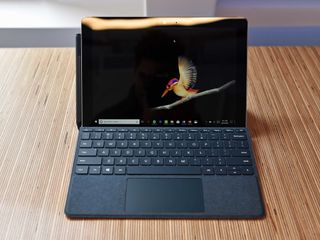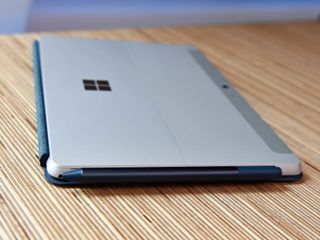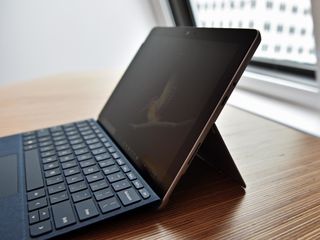
Microsoft's new Surface Go is expected to launch August 2, 2018, when it will be available in two different configurations (with more expected to be released in the future). Though both launch models have the same Intel Pentium Gold 4415Y processor (CPU), one of the main differences has to do with storage. The cheaper model has inside 64GB of embedded multimedia card (eMMC) storage, while the pricier model has a 128GB solid-state drive (SSD).
Wondering which model you should buy? Let's break things down to help you make a final decision.
How much storage do you actually get in a Surface Go?
Before we begin talking about storage numbers, it's best to get an idea of how much free space you'll actually have the first time you turn on your Surface Go. Models come with Windows 10 S installed, and visiting the Surface Storage page at Microsoft gives you an idea of what to expect. It hasn't yet been updated to include the Go, but by looking at other Surface devices it's evident that you can knock off between about 20GB and 30GB for the OS and pre-installed apps.
Instead of having 64GB or 128GB of useable space, you'll instead likely have about 40GB or 100GB of space. Keep this in mind as we explore further the Surface Go.
eMMC vs. SSD storage

Not only will you have less storage with the 64GB model, you'll also be dealing with eMMC storage. This type of storage is usually soldered right onto the motherboard, and will usually operate with less memory gates than an SSD. It might deliver data at the same speed, but it simply won't be able to deliver as much data at the same speed.
The 128GB SSD uses a non-volatile memory (NVMe) protocol, opening it up to a far larger volume of data transferred at once. If you're going to be working with large files, you'll no doubt want to stick with the SSD rather than eMMC storage. Think of it like a highway — with the SSD using multiple lanes both ways and eMMC only using one lane in each direction — for a better idea of what you're dealing with.
Get the Windows Central Newsletter
All the latest news, reviews, and guides for Windows and Xbox diehards.
Related: eMMC vs. SSD: Know the difference before buying a laptop
How will you use your Surface Go?

How you plan on using your Surface Go will help determine which storage you should check out with. While all models are indeed quite mobile, there are a couple of things to keep in mind.
Who should buy the 64GB Surface Go?
Starting at about $400, the 64GB Surface Go is more geared toward anyone who doesn't mind relying heavily on cloud storage and who doesn't plan on getting into any intensive tasks.
Beginner's guide to Microsoft OneDrive on Windows 10
Considering it has 4GB of RAM, it will be able to tackle light productivity tasks — word processing, web browsing, video watching — but don't expect it to replace your desktop. Though it's mobile, you can always keep an external hard drive nearby for your larger files.
Who should buy the 128GB Surface Go?
Starting at about $549, the 128GB Surface Go likewise has its RAM bumped up to 8GB for a bit of extra power. You'll no doubt notice less slowdown with multiple browser windows open, and as long as the CPU can keep up, you should be able to get in a bit more multitasking.
Despite the extra storage space, you might still arrive at a point where you need some additional cloud storage, especially if your Surface Go becomes a daily driver. Still, the SSD will serve you better when dealing with larger files and you won't be reaching for an external drive quite as quickly.
How to increase the storage in your Surface Go

Thanks to a microSD card reader that supports up to 1TB of extra storage, you can quickly add some space to your Surface Go for relatively cheap. We've rounded up some of the best cards for Surface Book 2, which should translate over to the Go.
Best microSD expansion cards for Surface Book 2
For those looking at cloud storage solutions, you'll get 5GB of free OneDrive storage with your account, which can be upgraded to 50GB for about $2 a month. From there, you can look into Office 365 subscriptions that include 1TB of cloud storage space for each user.
As always, don't forget about checking out our roundup of the best external drives on the market if you'd like to add some relatively bulky (but cheap) physical storage.
Best external hard drives of 2018
Which Surface Go will you choose?
Have you already preordered a Surface Go? Which configuration did you ultimately choose? Can you get by with 64GB, or do you absolutely need 128GB? Don't forget, there's expected to be a 256GB configuration coming sometime later this year as well. In any case, be sure to let us know in the comments section what you prefer!

Cale Hunt brings to Windows Central more than eight years of experience writing about laptops, PCs, accessories, games, and beyond. If it runs Windows or in some way complements the hardware, there’s a good chance he knows about it, has written about it, or is already busy testing it.
